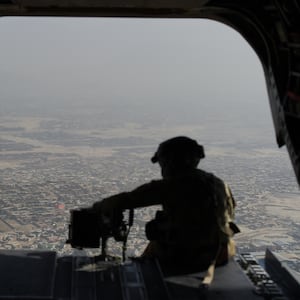U.S. President Joe Biden’s headlong drive to pull American forces out of Afghanistan—and the Taliban’s stunning military advance it opened up—is being criticized as a “heartbreaking” betrayal by key figures in U.K. Prime Minister Boris Johnson’s Conservative Party.
As major Afghan cities, including Kandahar, fall into the hands of Taliban fighters, and reports emerge of surrendering soldiers being slaughtered en masse, military veterans inside the U.K.’s ruling party have grown more outspoken in their criticism of U.S. policy.
Among them is Defense Secretary Ben Wallace, who warned on Friday that the withdrawal of forces would leave “a very big problem on the ground” and “probably” lead to the return of al Qaeda. “I’m absolutely worried that failed states are breeding grounds for those types of people,” he told Sky News.
As the Cabinet minister in charge of defense, Wallace has been careful to focus his criticism more on the “rotten” withdrawal deal reached with the Taliban under the Trump administration than to explicitly criticize Biden for the decision to press ahead with, and even speed up, the pullout.
But other leading Conservatives have no such qualms, including MP Tom Tugendhat, who served three tours in Afghanistan as a soldier and stayed on to work as a civil administrator. Tugendhat, who now chairs the Commons Foreign Affairs Committee, has expressed fury at the way Afghan forces were deprived of air support and left to face the Taliban alone after the abrupt abandonment of the Bagram air base in July.
Biden himself said this week that after 20 years and a trillion dollars worth of training, Afghan forces have “got to fight for themselves.” But Tugendhat said on Friday they simply couldn’t do so without air and logistical support. He compared it to the British Olympic cycling team being trained up for years at great expense, on the best bicycles, only to be given old tricycles when they arrived in Tokyo.
“We’ve just pulled the rug from under these guys. We’ve taken away their air support, we’ve taken away their logistics, and we’ve said to them: ‘Go on then, let’s see how you do.’”
Another Afghan vet on the Tory benches, former Armed Forces Minister Johnny Mercer, said the Afghan armed forces had been let down by both the U.S. and U.K. governments. “It’s heartbreaking to watch,” he told Sky News. “We will reap the repercussions from this for many years to come.”
During their two-decade deployment in Afghanistan, British forces sustained 545 fatalities—far fewer than the 2,316 American lives lost during the main period of fighting. Compared to the size of the force, however, U.K. troops sent to Afghanistan were actually twice as likely to be killed, according to a study by Brown University.
The sheer speed of the Taliban advance has shaken military experts on both sides of the Atlantic, prompting fears of a “fall of Saigon”-style humiliation for the Americans when the Taliban reach the Afghan capital, Kabul, in the coming weeks or months. The administration’s only leverage appears to be a threat to withhold future development funding if the Taliban refuse to abide by the terms of the withdrawal agreement and directly target the U.S. embassy in Kabul.
Critics of the U.S pullout, including Tugendhat and the former Conservative minister Rory Stewart, point out that in recent years the financial cost of the American deployment, focusing on air and logistical support for Afghan forces, had been minimal compared to previous years and there have been no U.S. combat deaths since February 2020.
“We now need to really step up,” said Stewart, who first came to public attention when he walked across Afghanistan as a young adventurer in 2002 and then on through Pakistan and Iran. “There are going to be millions of Afghans in horrifying conditions. It’s going to be heartbreaking.
“There will be millions of refugees. Iran and Russia will get into the vacuum that’s left behind... We’re going to have to radically step up our development spending and Europe and the United States are going to have to expect to take a lot of refugees. And we ought to, because this is our fault.”





